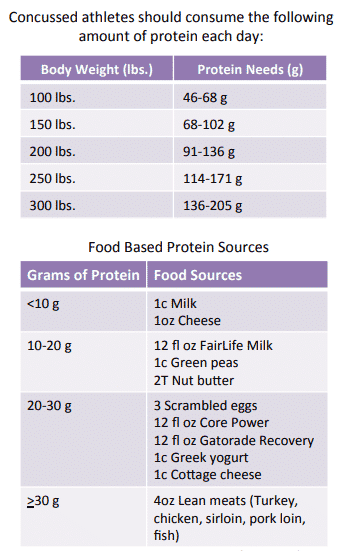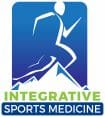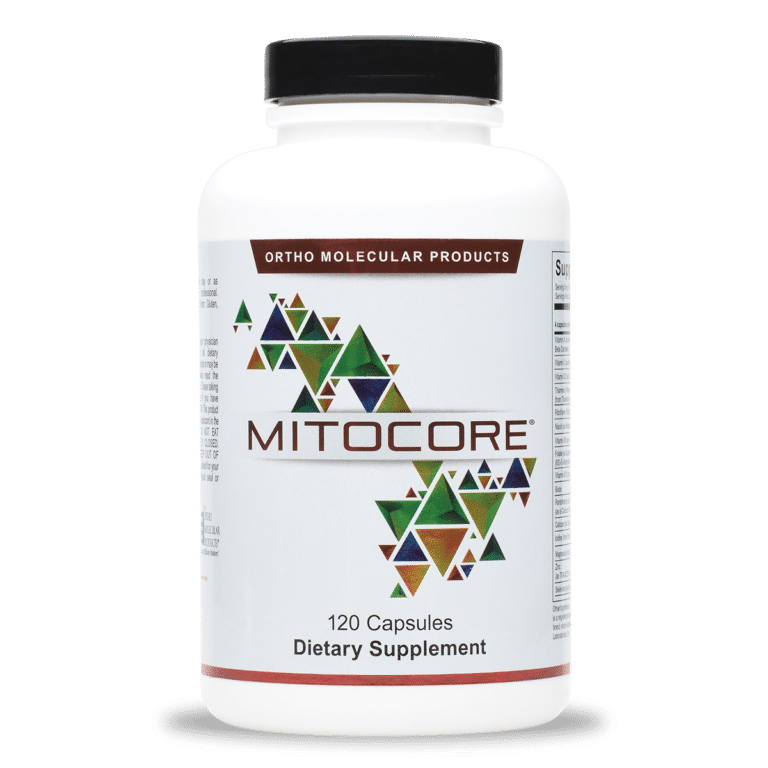A concussion (also known as a mild traumatic brain injury) is caused by a hit to the head or body that causes the brain to move rapidly inside the skull. Following a hit like this, blood flow slows down on its way to the brain forcing the brain into an “energy crisis.” During this “crisis” the brain demands an increase in energy supply. The neurons (nerve cells) are also at their most vulnerable during this period.
How to treat concussions with proper nutrition
The purpose of this article is to address the role that nutrition plays in concussion recovery. When determining how to care for a concussion initially, consult our Concussion Care page. Oftentimes, nutrition gets overlooked as a key piece in recovery. Like any other injured body part, the brain needs calories in order to heal. So following a concussion, follow these simple steps:
- Continue your normal caloric intake. This is not the time to diet.
- Maintain, if not increase, your protein intake. Protein serves a vital role in cell and tissue production and repair. Your brain needs repairing so give it the right tools to repair itself.
The chart to the right, by the National Athletic Trainers’ Association (2016), shows how many grams of protein you should consume per day during recovery. The chart also offers examples of good sources of protein.
All supplements are not created equal — not remotely. The Ortho-Molecular product-line is exclusively distributed to healthcare professionals, and I’ve exhaustively researched this topic and these products, and for purity of ingredients and quality of care, nothing I know of comes close to matching Ortho-Molecular. It is precisely because of their quality that they’re more expensive, but the difference is astounding. — Dr. Brad Abrahamson MD.
This is what I use because it is, quite simply, the best.
Click the image to learn more:

Don’t forget the other concussion repair tools
Following a concussion, levels of magnesium and zinc in the brain immediately drop – two crucial repair tools that the body utilizes. Magnesium lowers inflammation and helps rebuild/repair neurons. Zinc has been shown to help improve mood and cognition. In addition to protein, eat magnesium and zinc rich foods which include:
Magnesium-Rich Foods:
- Nuts/Seeds
- Avocados
- Legumes
- Whole Grains
- Tofu
- Leafy Greens
Zinc-Rich Foods:
- Meat
- Shellfish
- Nuts/Seeds
- Whole Grains
- Dairy Products
- Eggs
We recommend you restore these nutrients to their pre-concussion levels in order to shorten recovery time.
Do vitamins and supplements help during concussion recovery?
Several studies are also investigating the effects of additional vitamins and supplements for concussion recovery. It is widely accepted that increasing omega 3 fatty acids helps in recovery. Eicosapentaenoic acid (EPA) and Docosahexaenoic acid (DHA), two key omegas can be found in fish oils. These fatty acids reduce inflammation and promote healthy cell structure. Creatine, another widely accepted supplement during concussion recovery can be found in red meat, poultry, pork and fish. Creatine increases brain cell energy production as well as preserving the mitochondria (the power plant of each cell).
Antioxidant vitamins such as vitamin C, D and E are also being studied for their effectiveness in concussion recovery. Antioxidants reduce or delay cell destruction which may prove useful as the body repairs itself. Good sources of vitamin C include fruits and vegetables, particularly citrus/tropical fruits, berries and bell peppers. Good sources of vitamin D are fortified milk products and fortified plant-based beverages. Lastly, good sources of vitamin E include nuts/seeds, dark green leafy vegetables, avocado, wheat germ, fish and eggs.
Three other supplements also under investigation include resveratrol, melatonin and turmeric. Resveratrol is found in nuts, grapes, blueberries, cranberries and dark chocolate and is known to be neuroprotective (helping to preserve neuron structure and function). Melatonin is a hormone naturally released by the body and is also considered neuroprotective. It is currently being researched in humans because of promising studies in animals. Lastly, turmeric, or its component curcumin, is a spice known to increase neuron communication and decrease inflammation in animals. It has yet to be studied in humans in relationship to concussion repair.
Although these vitamins and supplements naturally occur in foods and our bodies and are therefore safe to include in your diet, consult the healthcare provider managing your head injury for recommended dosages and advice on what to eat during your concussion recovery.

